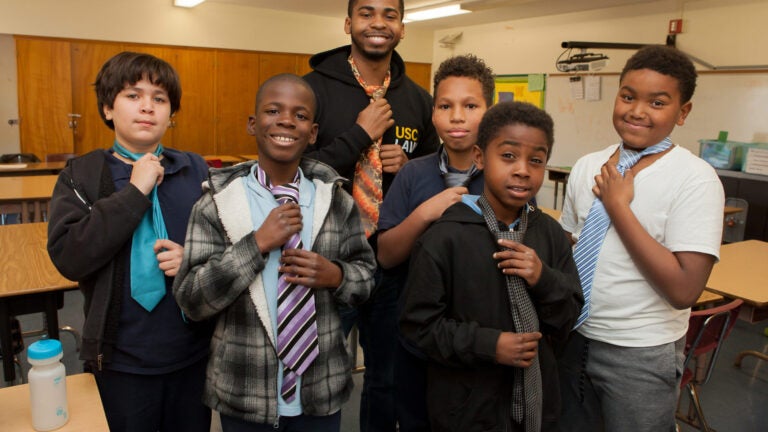
Michael Figgers shows 54th Street Elementary School students how to knot a tie. (Photo/Brett Van Ort)
Law students lead by example, showing youngsters that higher education is possible
Inspired by a USC Gould alumnus, Trojans serve as mentors for African-Americans at local school
The question was unexpected: “Why did you decide to go to USC law school?”
Up until this moment, the room had felt like a regular fourth- or fifth-grade classroom. Writing assignments had been given, journals distributed and students divided into working groups. But the fact that the curious student felt she could make the query — and receive an answer — is part of the overall goal of the E-Class Mentorship program: To show these students that higher education, a bachelor’s degree, even a J.D., are possible.
During the spring semester, five USC Gould School of Law students volunteered their Monday afternoons in a classroom at the 54th Street Elementary School in Leimert Park.
“One of our objectives is to help these students reach their maximum creative and academic potential,” said third-year student Michael Figgers, the founder and current director of E-Class. “You can tell them that they can be something and they’ll believe you. Especially if you show them that it has been done. They’ll always have it in the back of their minds that they can succeed in life.”
A belief in potential
Figgers launched the coed program two years ago, inspired by the late Judge Jimmy Reese ’46, who challenged Figgers and his fellow black USC Law students to mentor local African-American youth. Reese himself had received a life-changing boost from an elementary school teacher with a belief in his potential, and he wanted to pay it forward.
Reese introduced Figgers to Principal Haywood Thompson, and together they began to plan a curriculum and program that, Figgers said, could “create an impact.” Thompson worked with 54th Street’s teachers to identify students who would be receptive to mentorship and who had academic potential.
It was Figgers’ responsibility to find volunteer mentors.
“I reached out to law students who are African-American because of the demographics of the school, which is 99 percent black. We want to make sure that these students have mentors who look like them. This program would not be what it is without the valuable contributions from our volunteer mentors, as the students benefit from their presence and the sharing of their own life experiences,” he said.
But what Figgers didn’t know until he started mentoring the students is that a high number of them are foster children.
Our topics range from how to cultivate self-worth to how to interact with law enforcement.
Michael Figgers
“We tailored our lessons accordingly,” he said.
“Our topics range from how to cultivate self-worth to how to interact with law enforcement, how to offer a firm handshake and — for the boys — how to tie a necktie. We want to touch on what’s not taught in the classroom.”
The program culminated with a pizza party and a field trip to the USC campus in April.
Key life lessons
For Figgers, whose father taught him how to tie a necktie, the curriculum provides “other things that I wished I’d known early on, before I graduated from high school or college,” he said. “Some of these lessons are even more imperative now and are of greater importance than when I was their age — such as how to conduct yourself when approached by a police officer.”
After his own graduation from USC Gould in May, Figgers plans to continue the E-Class program (the “E” stands for “educate, envision, empower, encourage”). He’s working on an application for 501c3 status and forming an executive board.
His professional focus is finance and business law, and he hopes to expand E-Class to include teaching money management skills to middle and high school students
Figgers estimates the E-Class team has so far impacted the lives of about 65 fourth- and fifth-grade students. He proudly recounts the story of a student who had been held back for two years, but his academic performance improved once he completed the E-Class program and moved on to middle school.
It’s that type of impact that propels Figgers to return to 54th Street each week. As Thompson recently reminded him: “I think the legacy of Judge Reese is living out through you, Michael.”
